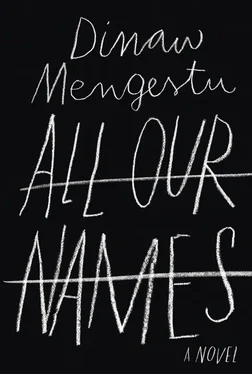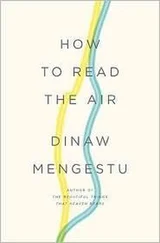The man who had brought me to the village turned his attention briefly toward me, as did the other men from inside their own compounds. Every one of them was armed — a few with guns, the rest with machetes, hoes, and axes — and I felt certain that when they looked at me each was thinking a variation of the same thought: Why have we let this man stay with us for so long?
I waved to the boy and his father. Neither acknowledged me, nor did anyone else in the village. Everyone was focused on the newest arrivals. They were a threat — both foreign and desperate and twice as dangerous as a result — but what to do with them remained, at least for those few minutes, uncertain.
The man who had brought me to the village stepped forward. As soon as he did so, a decision was reached. Every other man in the village came forward and joined him. They formed a parallel line of defense, twenty men strong, through which no one, regardless of how desperate, would be allowed.
The townspeople could have held their position until the crowd retreated back into the forest; they could have threatened the refugees by firing once in their general direction. But neither action would have solved the problem of what to do with that mass if they eventually returned, whether that evening or the next. Isaac was wrong: the problems were everywhere, and growing by the hour. New victims and killers were being bred far from the battlefields.
The men in the village knew what they were doing. They had planned for this, or lived through it before. They spoke among themselves briefly, and then those with guns fired into the crowd without pausing to aim. The intent was to kill everyone, and so it made no difference who died first.
Among the refugees, those capable of running did so without looking back. I saw maybe a dozen women and children flee into the bush. Those who couldn’t simply stood there, or sat, or draped themselves over the bodies of those who had just been shot, and waited to die. The few able-bodied men among the crowd attacked with knives. They were fired upon. None of them were hit, though two women behind them were. Had they stayed together, they might have stood a greater chance, but each man charged on his own, and each was quickly surrounded by three men from the village, and cut down slowly with machetes and hoes.
Every man in the village took part in killing those left huddled at the edge of the forest. They did so with hard blows straight to the head. I could tell by the way they slung their weapons that they were farmers. Once they had finished, the men lined up again and marched into the bush. They would kill the ones they found, and leave the rest to die on their own. I didn’t stay long enough to hear them tell the story. The women and children began to drag the bodies into the forest. As they did so, I tried to write down what had happened. I thought of counting the dead, but I was too far away to do so. I tried next to describe one of the bodies, but all I could see was death — no eyes, no face, just a blank emptiness I didn’t have the stomach to look at closely. When that failed, I tried to describe a woman dragging what looked to be an old man through the grass, but before I knew what to write, she was gone and then walking back, empty-handed. By the time I finally turned away from her, it was almost over. The bodies were hidden in the forest, which would swallow the remains before anyone knew to look for them. I had no names, not even of the village, which was too small to have existed on any map. And so I did the only thing I could think of. I waited until no one was watching me, and then left. As I walked back to Joseph’s village, I drew a map of the route. I recorded every bend in the road, and the few forks that I came upon, along with sketches of a few long-abandoned thatch-roofed homes barely visible from the path. It was far from poetry, less than a journal, and worthless as history.
One of the few games my father played with me when I was a child had us speeding through town as if we were outlaws. He would ask if I heard the sirens behind us, and as soon as I said yes, he would tell me to fasten my seat belt because we were going to drive so fast that no one would ever be able to catch us. As we pulled away from Rose’s house, I was grateful to have found a fond memory of him to relive. I played that game silently, through two stop signs that I barely paused for and a yellow light I had no chance of making, until we reached the end of Laurel. I pulled over just on the other side of the sign that I had memorized when I was ten, and which had never changed since: “Laurel, Inc 1872. Pop: 15752.”
I asked Isaac if he wanted to take one last look back.
“Turn around and enjoy the view,” I said. “Who knows when you’ll see it again?”
Recently harvested cornfields lay on both sides of the road, a silver grain silo a few hundred yards ahead. There were no cars in either direction. The emptiness was one of the things I loved most about the rural Midwest.
Isaac did what I asked him to do. He turned around and stared at the landscape, which was virtually the same as the one in front of him. As soon as he finished, I pulled away. He didn’t know he was leaving, so I said his goodbyes for him. As I drove, I said goodbye to his apartment, to the books that he left behind, to the university library, to all the furniture we had bought together, to the apartment as a whole, and then to every place I could remember that we had gone to together, from the post office to the grocery store and Bill’s diner, and then to David, whom he had never met, and his file, which he had never seen, and then to the rest of Laurel, the parts known and unknown to him.
I finished just as I reached the entrance to the highway. I was far from crying, but at some point several tears had crawled out from under my eyes. Isaac saw them running down my face. He smudged them against my cheek with his thumb.
“What’s happening?”
I knew what I wanted to say: “I’m letting you go, slowly, in pieces, so it won’t break me.” I told him instead that I was thinking of Rose.
When we reached the highway, I asked Isaac to take out the atlas in the glove box and choose the route. He placed it on his lap and began to survey the country. He was delighted when he found a Cairo, an Athens, a Paris, and a Rome in America. He said we should continue going east, like all the signs suggested.
“This country,” he said. “What don’t you have?”
What we didn’t have, for all that space, were many places where Isaac and I could publicly rest without fear of who was watching us. When we stopped for lunch at a restaurant off the highway, it was impossible not to notice the hostile glares of many of the men dining there alone. They were deaf and blind to the world until we entered; once they saw us, all they could do was glare over their coffee cups and from under the brims of their hats. No one said anything to us. Our waitress, who must have been near my mother’s age, called us both “dear” and “honey” with the same general affection. Isaac and I were different with each other — not harsh or cold, as we had been during that terrible lunch at Bill’s, just slightly separated by an invisible, but no less real barrier, a chest-high fence that we could still talk and see through rather than a wall that hid us completely from each other. We did our best not to be bothered. We didn’t hold hands, we didn’t touch, but we kept our eyes focused exclusively on each other as we ate our lunch and drank our coffee. At one point, when neither of us had spoken for several minutes, Isaac said, “On the count of three, laugh.” At three, we began to giggle and then cackle, and then laugh with what felt like genuine delight. We left with the better part of us intact.
Читать дальше












